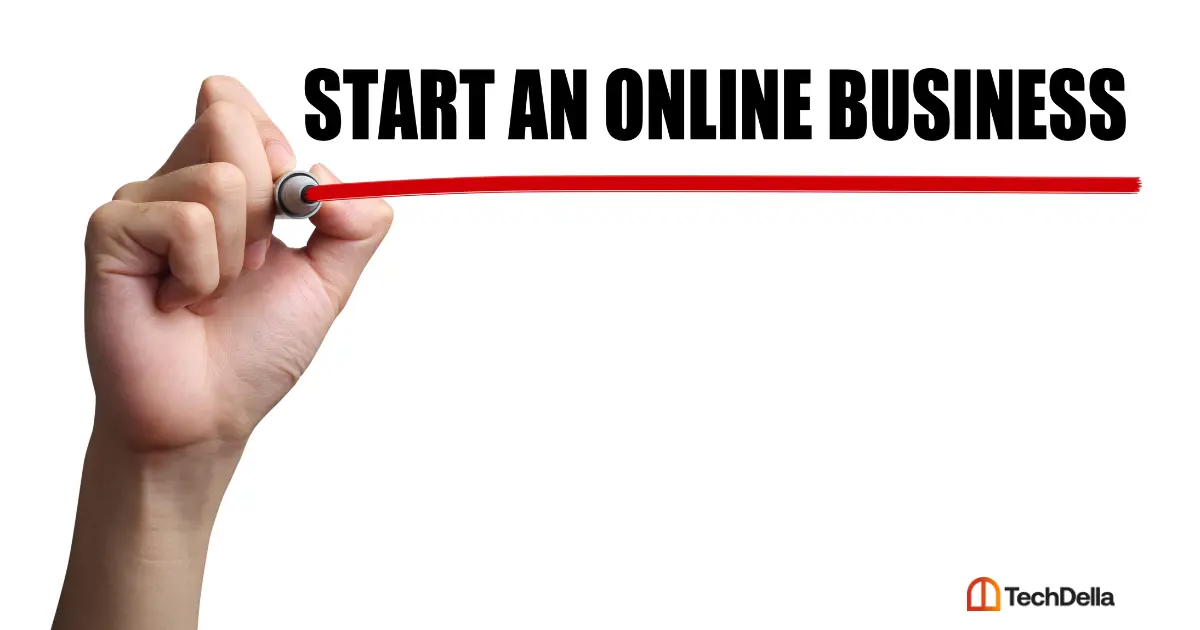
How to Start an eCommerce Business in 2025 (Step-by-Step for Beginners)
TechDellaeCommerce Insights2 months ago10.4K Views
- Home
- eCommerce Insights
- How to Start an eCommerce Business in 2025 (Step-by-Step for Beginners)
Traditional brick-and-mortar shops are quickly giving way to the unstoppable rise of the eCommerce business. With its borderless reach and limitless potential, online stores are transforming how entrepreneurs connect with customers around the world. For anyone looking to launch their own venture, the eCommerce business space presents a golden opportunity.
If you’ve ever had a passion for online sales and a creative spark—whether in product design, marketing, or craftsmanship—you already have the essential ingredients to succeed in this rapidly growing industry.
The numbers speak volumes: as of September 2022, the eCommerce business sector accounted for 15% of all retail sales in the United States—a clear indicator of its booming potential. Whether you’re drawn to fashion, tech gadgets, home decor, or niche products, there’s a place for you in the digital marketplace.
In this blog, we’ll walk you through the journey of launching your own eCommerce business—from shaping your idea to building and scaling it into something remarkable. Let’s dive in!
What is an eCommerce Business?

An eCommerce business, short for electronic commerce business, is a type of commercial activity that takes place online through the Internet. It involves buying and selling products or services over digital platforms and electronic means.
Unlike traditional stores that rely on physical locations, eCommerce businesses run entirely on digital platforms like websites or marketplaces (e.g., Amazon, Shopify, or Jumia).
Read more about Best eCommerce Platform for Startups
Key Features of an eCommerce Business
Here are the characteristics of an ecommerce business:
Read more about Best eCommerce Business examples
1. Online Presence
eCommerce businesses primarily exist on the internet. They typically have a website or use online marketplaces, such as Amazon, eBay, or Shopify, to showcase and sell their products or services.
2. Digital Transactions
Transactions in eCommerce are conducted electronically through contactless payments or biometric payment options. Customers make purchases, pay for products or services, and receive order confirmations, invoices, and receipts online.
3. Product or Service Offerings
eCommerce businesses can offer a wide range of products or services, from selling physical goods like clothing, electronics, and books to selling digital products like software, ebooks, and online courses.
4. Global Reach
One of the significant advantages of eCommerce is its potential to reach a global audience. Customers from different parts of the world can access and purchase from your online store.
5. Payment Gateways
eCommerce businesses utilize online payment gateways to securely process payments. Common payment methods include credit/debit cards, digital wallets, and online payment services likePayPal in Nigeria.
6. Shipping and Delivery
Depending on the business model, eCommerce companies may ship physical products to customers. This involves logistics and may include options for different shipping methods and tracking.
7. Customer Experience
Providing a user-friendly, intuitive, and secure online shopping experience is crucial for eCommerce businesses. This often involves features like product search, detailed descriptions, reviews, and customer support.
8. Digital Marketing
eCommerce businesses heavily rely on eCommerce marketing strategies and eCommerce marketing tools to attract and retain customers. This can include search engine optimization (SEO), social media marketing, email marketing, and paid advertising.
9. Analytics and Data
Data-driven decision-making is a core aspect of eCommerce. Businesses often track and analyze customer behaviour, sales metrics, and website performance to make informed decisions and optimize their operations.
Read more about Important E-Commerce Metrics Every Business Owner Should Track
10. Security and Privacy
Ensuring the security of customer information and transactions is paramount in eCommerce. SSL certificates, encryption, and compliance with data protection laws are common practices.
There are various types of eCommerce businesses, including business-to-consumer (B2C), business-to-business (B2B), and consumer-to-consumer (C2C) models.
The specific nature and focus of an eCommerce business can vary widely, but the common thread is the use of digital technology to facilitate buying and selling online.
How To Start An Ecommerce Business For Beginners
Starting an eCommerce business is an exciting venture, but it involves several crucial steps to ensure a successful launch.
Read more about the Types of eCommerce Businesses
Let’s take a comprehensive look at how to start an eCommerce business from inception to realization.

1. Market Research and Niche Selection
The first step in starting an eCommerce business is thorough market research. Dive into the eCommerce landscape to identify trends and potential niches. This research is crucial in understanding the market’s demands and customer behaviour.
Define your target audience, their preferences, and pain points. Analyze your competition, identifying gaps in the market that you can fill with a unique selling proposition.
Check out our guide on eCommerce Business Ideas to Start Online
2. Business Planning
Creating a solid business plan is the foundation of your eCommerce business. Your plan should outline your goals, strategies, and financial projections.
Decide on your business structure, such as a sole proprietorship, LLC, or corporation, and ensure that you obtain any necessary licenses or permits required for your business.
Check out our guide on eCommerce Business Plan templates
3. Product Selection and Sourcing
Choose the products you wish to sell in your eCommerce store. Consider market demand, your target audience’s interests, and the niche you’ve selected.
Determine how you’ll source your products, whether through manufacturing, wholesale suppliers, dropshipping, or creating your unique products.
4. Evaluating eCommerce Platforms
Select the right eCommerce platform for your business. Popular choices include Shopify, WooCommerce (if you’re using WordPress), BigCommerce, and Magento. Factors like ease of use, scalability, and the availability of essential features should guide your decision.
Read more about Best eCommerce Marketplace Platforms for Businesses
5. Domain and Hosting Selection
Secure a domain name that aligns with your brand identity. Choose a reliable hosting provider to ensure your website has fast loading times and 24/7 support.
Read more about Top Free Domain Websites and Their Pros and Cons
6. Website Development
Design your eCommerce website with an emphasis on user-friendliness. Display high-quality product images and ensure your website has a clear and easy-to-navigate structure. Implement a secure payment system and checkout process to build trust with your customers.
7. Product Listings and Descriptions
Craft compelling product descriptions with detailed information that helps customers make informed decisions. Optimize your product listings for search engines (SEO) to improve your store’s visibility.
8. Website Optimization
Make sure your website is mobile-responsive to cater to users on smartphones and tablets. Work on improving your website’s loading speed and implementon-page SEO practices to boost your search engine rankings.
9. Payment and Security
Establish secure payment gateways to process customer transactions efficiently. Acquire an SSL certificate to protect customer data and build trust in your online store’s security.
10. Fulfillment and Shipping
Choose a shipping strategy that aligns with your business model and customer expectations. Offer various shipping options to cater to different customer needs.
Implement a tracking system for shipments to keep customers informed. If your business operates internationally, consider international shipping options.
11. Marketing and Promotion
Develop a comprehensive marketing strategy that encompasses social media marketing, email marketing, content marketing, paid advertising, and influencer marketing. Create a marketing budget and calendar to manage your marketing efforts effectively.
You can engage with potential customers on social media, build an email subscriber list, and create valuable content to attract and retain customers.
Check out our guide on eCommerce Sales Strategies
12. Customer Service and Support
Establish a robust customer support system that allows you to respond to inquiries and issues promptly. Develop a clear return and refund policy to manage customer expectations. Focus on building customer loyalty through excellent service.
13. Analytics and Optimization
Utilize analytics tools to track key performance indicators (KPIs) and analyze customer behaviour. Continuous optimization based on data is essential for long-term success.
14. Scaling Your eCommerce Business
As your eCommerce business grows, consider expanding your product range or exploring international markets. Automate processes where possible to streamline operations.
You might also think about outsourcing tasks like customer support or order fulfilment to manage increased demand effectively.
15. Legal and Compliance Considerations
Protect your business by securing trademarks or patents, if necessary. Ensure compliance with data protection and privacy regulations, and stay informed about your tax obligations and international shipping regulations.
16. Launch and Post-Launch Marketing
Promote your website before and after the launch to create buzz and draw in your first customers. Keep a close eye on your site’s performance and make necessary improvements to enhance the customer experience and drive growth.
Starting an eCommerce business is a journey that demands dedication, careful planning, and a commitment to learning and adapting to the ever-evolving eCommerce landscape.
Success in this field often requires ongoing efforts to meet customer expectations and grow your business.
Check out our guide on Steps to Launching a Successful e-Commerce Startup.
Don’t Sleep On It
Starting an eCommerce business in 2025 isn’t just for techies or big brands. With the right tools, strategy, and mindset, anyone can build a successful online store—from their bedroom, cafe, or coworking space.
Yes, there will be challenges. But with patience, consistency, and creativity, you can turn your idea into income—and your passion into a thriving business.
So, what are you waiting for? The world is your marketplace
Related Posts
Stay Informed With the Latest & Most Important News
Previous Post
Next Post
Previous Post
Next Post
Search Posts
About Us
At Techdella, we’re all about empowering businesses and startups with the tools, tips, and insights they need to thrive. From tech trends to marketing strategies, social media hacks to website tips, we break it all down in a fun, easy-to-digest way. Let’s innovate, grow, and win together!
Tags
Blogging Business Blog Niches Business Growth Business Guide Business Ideas Business Owners Business plan Cybersecurity Digital Marketing Digital Products Domain Names Early stage entrepreneurs ecommerce eCommerce Marketing Email Marketing Email marketing tools Entrepreneur’s Guide Featured Holiday Marketing Holiday promotions Influencer Marketing Marketing Marketing Campaign Marketing tools Mobile App Business Mobile Apps Monetization Tips Popular Promotions SaaS Business SEO seo for startups SEO Marketing Small Business Guide Social Media Campaign Social media marketing Software Business Startup Guide Startup teams startup tools Tech Startups VPN Website Hosting Website Monetization WordPress Hosting




























